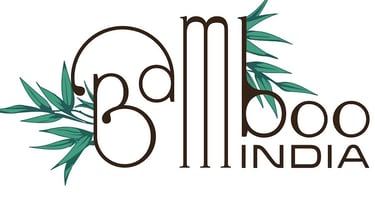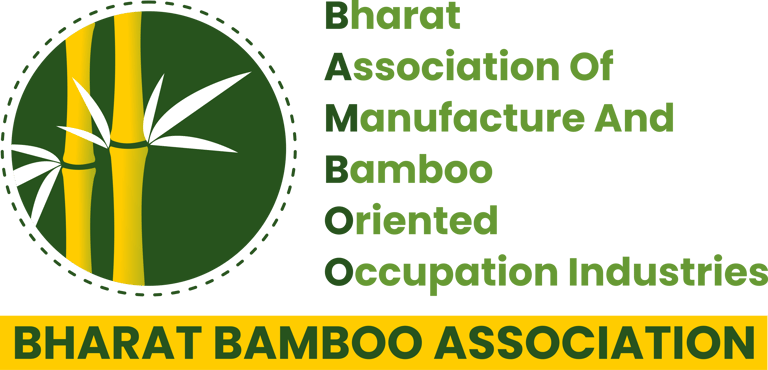
Welcome to
BHARAT ASSOCIATION
OF MANUFACTURE & BAMBOO ORIENTED OCCUPATION INDUSTRIES.
Unleashing the Power of Bamboo for Sustainable Living
Bamboo Sector in India
Bamboo has played a crucial role in India's rich history, deeply woven into its cultural, economic, and environmental fabric. Traditionally, bamboo has served diverse purposes, from construction and tool-making to artistic expression. In rural areas, it has been a fundamental part of daily life, contributing to housing, fencing, and handicrafts.
In recent decades, there has been a renewed interest in India's bamboo industry, fueled by concerns for sustainability and economic opportunities. Recognizing bamboo as a strategic resource, the government has implemented policies to promote its cultivation and utilization, particularly in the Northeastern states where substantial bamboo growth initiatives have taken root.
The future of the bamboo business in India holds great promise as it aligns with sustainable development goals. Bamboo's versatility positions it as a valuable resource for industries such as construction, furniture, and as a substitute for traditional materials. The potential for bamboo-based products in the global market also stands to boost India's economy.
However, there are challenges to address, including outdated processing techniques, limited awareness, and inconsistent policies. With adequate investment, research, and community involvement, India's bamboo industry has the potential to thrive, providing a sustainable and eco-friendly alternative across various sectors.
"If it can't be done with bamboo, it probably shouldn't be done."
Integrated Bamboo Processing Approach in Maharashtra
The bamboo processing industry in Maharashtra, India, is undergoing a significant transformation through the adoption of Integrated Regional Models. Maharashtra's diverse climate and geography offer a unique opportunity to develop a sustainable and flourishing bamboo sector.
Local Bamboo Varieties: Maharashtra is home to various bamboo species, each adapted to specific regions within the state. Integrated Regional Models focus on leveraging this diversity by tailoring processing techniques to suit the characteristics of local bamboo varieties. This approach ensures optimal resource utilization and enhances the quality of bamboo products.
Sustainable Practices: Emphasizing sustainable and eco-friendly practices is integral to the integrated approach in Maharashtra. By aligning processing methods with the state's ecosystems, the industry aims to minimize environmental impact, contributing to the preservation of bamboo forests and the biodiversity they support.
Economic Growth and Employment: Integrated Regional Models in Maharashtra seek to empower local communities by involving them in bamboo cultivation, harvesting, and processing. This decentralized approach not only generates employment opportunities but also stimulates economic growth at the regional level. Maharashtra's bamboo industry can become a driver for inclusive development, particularly in rural areas.
Preservation of Cultural Heritage: Bamboo holds cultural significance in Maharashtra, and Integrated Regional Models aim to integrate traditional knowledge and practices into modern processing methods. This ensures the preservation of cultural heritage while enhancing the market appeal of bamboo products with authentic, locally inspired designs.
Market Alignment: Understanding the dynamics of Maharashtra's market is crucial for the success of integrated bamboo processing. By aligning production with local market needs, the industry can cater to specific preferences and applications of bamboo products in the region. This market-centric approach enhances competitiveness and ensures sustained demand.
Government Initiatives: Collaboration with government bodies is essential for overcoming challenges and creating an enabling environment for the bamboo industry in Maharashtra. Supportive policies, infrastructure development, and technological advancements can address barriers to growth, facilitating a more robust and competitive sector.
Challenges and Opportunities: While challenges such as infrastructure limitations and regulatory issues exist, they can be seen as opportunities for collaboration and innovation. By addressing these challenges collectively, Maharashtra's bamboo industry can emerge as a model of sustainable development and economic resilience.
In conclusion, the adoption of Integrated Regional Models in Maharashtra's bamboo processing industry signifies a positive shift toward sustainability, economic empowerment, and cultural preservation. With a strategic focus on local resources, community involvement, and market responsiveness, Maharashtra has the potential to become a leading hub for the bamboo sector in India.

Become Member
Embark on a journey through our vision, mission, and the impactful work we're doing to empower small farmers and transform lives through bamboo.
Our partners





BHARAT ASSOCIATION OF MANUFACTURE AND BAMBOO ORIENTED OCCUPATION INDUSTRIES
Sr. No.68, Pashan Road, Nr. Kirti Garden, Sus, Pune City, Pune- 411021, Maharashtra
Email: contact@bharatbambooassociation.org
Whatsapp for Enquiry :+91-7721918887


